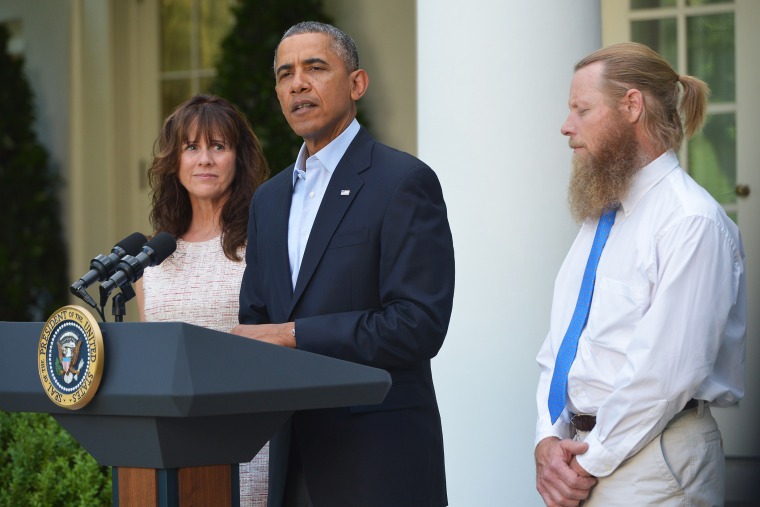Under normal circumstances, when U.S. officials secure the release of an American prisoner of war, it would seem like a happy occasion for the country, regardless of political considerations. We were reminded over the weekend that these are not normal circumstances.
President Obama announced on Saturday that Sgt. Bowe Bergdahl, the only American soldier held captive in Afghanistan, was finally free after five years as a prisoner of the Taliban, In exchange for his release, U.S. officials agreed to release five Taliban prisoners from Guantanamo Bay to Qatar.
In his White House announcement, the president said, in reference to the Taliban detainees, "The Qatari government has given us assurances that it will put in place measures to protect our national security."
The complaints from congressional Republicans were immediate.
Amid jubilation Saturday over the release of U.S. Army Sgt. Bowe Bergdahl from captivity by the Taliban, senior Republicans on Capitol Hill said they were troubled by the means by which it was accomplished, which was a deal to release five Afghan detainees from the military prison in Guantanamo Bay, Cuba. Top Republicans on the Senate and House armed services committees went so far as to accuse President Obama of having broken the law, which requires the administration to notify Congress before any transfers from Guantanamo are carried out.
Throughout the weekend, prominent GOP lawmakers condemned the move with varying degrees of outrage. Several Republicans described the policy that led to Bergdahl's release as "shocking," "disturbing," and "dangerous."
Any sense of national joy that might otherwise come with the knowledge that an American POW is on his way home disappeared within minutes of the announcement -- Bergdahl's freedom quickly became the latest partisan fight, and the prospect of congressional hearings are more a matter of "when," not "if."
For Republicans, this is an outrage: as Karen Tumulty reported, the administration is required to notify relevant congressional committees 30 days before prisoner transfers, and this clearly did not happen. For Democrats, there were extenuating circumstances that required a legal shortcut: without immediate action, the opportunity to rescue an American POW would probably be lost forever, and Bergdahl's life would be in severe jeopardy. "We did not have 30 days to wait," Susan Rice said yesterday.
Who's right? In this case, probably both.
But Republicans went on to raise a separate concern. House Intelligence Committee Chairman Mike Rogers (R-Mich.), among others, condemned the White House for having "negotiated with terrorists." The Michigan Republican added that the move marked a "fundamental shift in U.S. policy."
That's a nice soundbite, but it's also wrong.
In principle, the United States does not negotiate with terrorists, which is a sensible policy intended to discourage terrorism. In practice, the United States has negotiated with terrorists plenty of times.
For example, when terrorists hijacked TWA Flight 847 in 1985, the Reagan administration negotiated with the hostage takers, despite the U.S. policy, and despite fears that it might create an incentive for future hijackings.
More recently, and more to the point, military leaders appointed by the Bush/Cheney administration, at David Petraeus' behest, endorsed negotiations with the Taliban years ago in the hopes of improving national security conditions in Afghanistan*.
The politics surrounding negotiations to free Bergdahl have been ugly for a long while, so this weekend's rhetoric hardly came as a surprise. What's more, many of the questions that have been raised about the move deserve answers.
But let's not pretend that talking to the Taliban represents some kind of shocking twist.
* edited slightly for clarity
